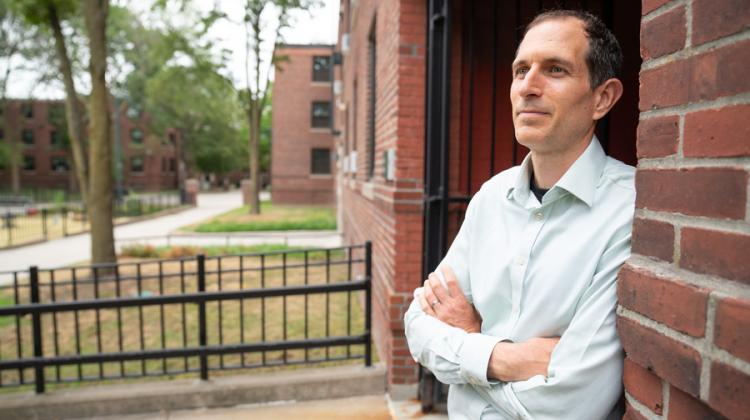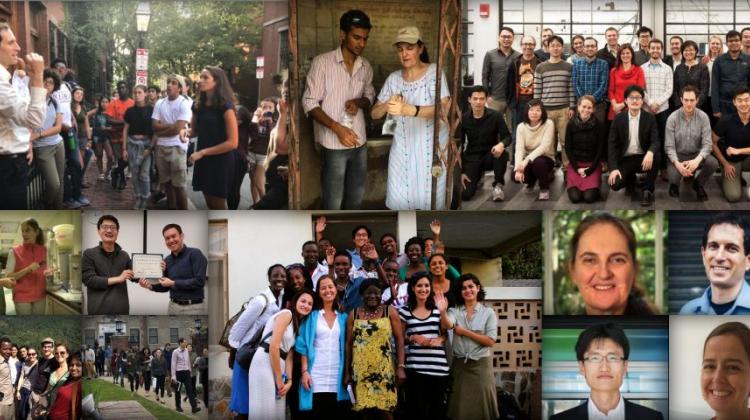Justin Steil
Justin Steil (CV) is an Associate Professor of Law and Urban Planning. His research analyzes how power and inequality are created and contested through control over access to particular places. As a lawyer and urban planner, his scholarship disentangles how the structure of local governance and land use law interacts with housing policies to shape the spatial structure of our social world in ways that produce economic and racial inequality. He also analyzes how zoning and housing policies can be redesigned to increase equality of access to resources and advance racial justice. Recent scholarship has focused on the relationship between space, power, and inequality in three main areas: 1) environmental justice, especially the intersection of housing and climate change related disasters; 2) affordable housing and housing discrimination; and 3) local governance and land use regulation.
He is the co-editor of three books: Furthering Fair Housing: Prospects for Racial Justice in America’s Neighborhoods (2021); The Dream Revisited: Contemporary Debates about Housing, Segregation, and Opportunity (2019); and Searching for the Just City: Debates in Urban Theory and Practice (2009).
On the intersection of housing policy and environmental justice, recent work has focused on flooding disasters and the experiences of renters with low-incomes, including “A Perfect Storm? Disasters and Evictions” (2022) in Housing Policy Debate; “In Harm's Way? The Effect of Disasters on the Magnitude and Location of Low‐Income Housing Tax Credit Allocations” (2022) in the Journal of Policy Analysis and Management; and “Affordable Housing, Disasters, and Social Equity: LIHTC as a Tool for Preparedness and Recovery” in the Journal of the American Planning Association (2020).
On affordable housing and housing stability, recent scholarship has focused on gentrification and eviction, including: “Eviction Dynamics in Market-rate Multifamily Rental Housing” in Housing Policy Debate (2021); and “Mapping Gentrification and Displacement Pressure: An Exploration of Four Distinct Methodologies” in Urban Studies (2020).
On housing discrimination and responses to it, recent research includes “The Social Structure of Mortgage Discrimination,” in Housing Studies (2018); “Antisubordination Planning” in the Journal of Planning Education and Research (2018); “Limits of Diversity: Jane Jacobs, the Just City, and Anti-Subordination” in Cities (2019); and “The Sociology of Segregation and Fair Housing” (2020) published in Perspectives on Fair Housing. Other related scholarship on the Affirmatively Furthering Fair Housing Rule includes “The Fairest of Them All: Analyzing Affirmatively Furthering Fair Housing Compliance” (2019) and “Survival of the Fairest: Examining HUD Reviews of Assessments of Fair Housing” (2019), both in Housing Policy Debate.
On local governance and land use regulation, recent work has examined planning and metropolitan inequality in comparative perspective, including: “Varieties of Urbanism: A Comparative View of Inequality and the Dual Dimensions of Metropolitan Fragmentation” in Politics & Society (2020); and “Local power and the location of subsidized renters in comparative perspective: public support for low-and moderate-income households in the United States, France, and the United Kingdom” (2021) in Housing Studies.
Prior scholarship on immigration federalism includes “The New Immigration Contestation: Social Movements and Local Immigration Policymaking in the United States, 2000-2011,” in the American Journal of Sociology (2014) and “Small Town Defenders: The Production of Citizenship in Hazelton, Pennsylvania” (2012) in Environment and Planning D: Society and Space.
Justin also co-authored an Amicus Brief on behalf of housing scholars to the United States Supreme Court in Bank of America et al. v. City of Miami and is a frequent expert witness in federal civil rights litigation. Justin’s research has been cited in federal court opinions and other briefs to the Supreme Court. With his students, Justin has also created an online library of primary sources and research regarding the 2015 Affirmatively Furthering Fair Housing Rule.
Before coming to MIT, Justin was a Fellow at the Furman Center for Real Estate and Urban Policy at New York University Law School. Prior to NYU, he clerked for the Hon. M. Margaret McKeown, United States Court of Appeals for the Ninth Circuit, and the Hon. Kimba M. Wood, United States District Court for the Southern District of New York. Before graduate school, he worked as advocacy director for a non-profit fighting predatory lending practices, urban planner for an environmental justice organization focusing on brownfield redevelopment, program manager for a project bringing youth and prisoners into critical dialogues about justice, and trainer with a domestic violence crisis center instructing police in Ciudad Juárez in the support of survivors of sexual assault.
Justin received a B.A. from Harvard College in African-American Studies, an M.Sc. from the London School of Economics in City Design and Social Science, a J.D. from Columbia Law School, and a Ph.D. in Urban Planning from the Columbia Graduate School of Arts and Sciences. For most of the past two decades, he has volunteered teaching in jails or prisons, and he has co-founded volunteer teaching programs at Boston’s Suffolk County House of Correction; New York City’s Riker’s Island Correctional Facility; and the federal Metropolitan Correctional Center in Manhattan.
Justin serves on the Board of the Poverty and Race Research Action Council and was formerly a member of the Boston Federal Reserve Bank's Community Development Research Advisory Council. He is an affiliate of MIT’s Women’s and Gender Studies program, Sociology at MIT, and MIT’s Legal Studies Concentration. Justin is also a member of the Steering Group of the Inter-University Consortium on Migration and a member of the faculty council of the MIT Community Innovators Lab (CoLab). Justin is a researcher in residence for Boston Emergency Medical Services (EMS) and an Emergency Medical Technician for MIT EMS.
The department’s students awarded Justin the Departmental Teaching Award in 2016 and the Office of Graduate Education awarded him the Committed to Caring Award in 2018 for “professors who go above and beyond expectations to make a positive impact on the lives of graduate students.” MIT in 2018 awarded Justin the Paul Gray Award for Public Service, recognizing “a member of the MIT faculty who exemplifies building a better world” through his or her teaching, research, advising, and service.” In 2021, the Graduate Student Council awarded Justin the Frank E. Perkins Award for Excellence in Graduate Advising and MIT awarded the Harold E. Edgerton Award for exceptional contributions in research, teaching, and service.
Courses
Introduction to Housing, Community, and Economic Development
Provides a critical introduction to the shape and determinants of political, social, and economic inequality in America, with a focus on racial and economic justice. Explores the role of the city in visions of justice. Analyzes the historical, political, and institutional contexts of housing and community development policy in the US, including federalism, municipal fragmentation, and decentralized public financing. Introduces major dimensions in US housing policy, such as housing finance, public housing policy, and state and local housing affordability mechanisms. Reviews major themes in community economic development, including drivers of economic inequality, small business policy, employment policy, and cooperative economics. Expectations and evaluation criteria differ for students taking graduate version.
Place, Race, and Law: Land Use and Civil Rights Law
Examines the intersection of race, place, and law by studying the how the use of land is controlled. It begins with a brief introduction to the U.S. legal system. It introduces basic concepts in property law and then focuses the regulation of land use as well as state and local government law. It examines why and when government regulation, rather than private market ordering, might be necessary to control land use patterns. It examines the rights of owners of land and the types of regulatory and market-based tools that are available to control land use in the United States and provides a framework for evaluating these tools. Issues discussed include zoning ordinances, subdivision creation, land assembly, and takings. It then presents common legal challenges to land use regulations and decision-making. The course introduces students to basic principles of civil rights and antidiscrimination law and focuses on the role of the land use regulatory system and structure of local governance in perpetuating or addressing racial inequality, including topics such as exclusionary and inclusionary zoning, metropolitan fragmentation, and gentrification. The course concludes by considering land use regulation in relation to the powers of states and local governments and issues of racial and economic equity. The course explores three fundamental normative questions: who should control how land is used, how should they do it, and what are the implications of both of the prior questions for racial equity?
Laws of the Land: Environmental and Land Use Laws
Examines the intersection of environmental law with property and land use laws, and how they relate to environmental protection and climate change. It begins with a brief introduction to the U.S. legal system. It explores the legal process of land transfer and the legal structure of development rights and the regulation of land use in the United States. It presents basic pillars of environmental law including the National Environmental Policy Act, the Clean Air Act, Clean Water Act, and the Comprehensive Environmental Response, Compensation, and Liability Act, examining the intersection of each with issues of land use and real estate development. It also reviews state and local efforts to address climate change through land use regulation and building code changes.
Quantitative Reasoning and Statistical Methods for Planning I
Develops logical, empirically based arguments using statistical techniques and analytic methods. covers elementary statistics, probability, and other types of quantitative reasoning useful for description, estimation, comparison, and explanation. Emphasis on the use and limitations of analytical techniques in planning practice. Restricted to first-year MCP students. Students are required to attend one of the three scheduled recitation sections.












